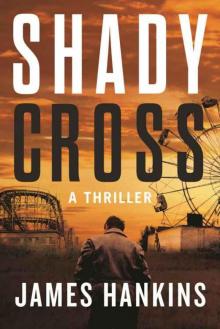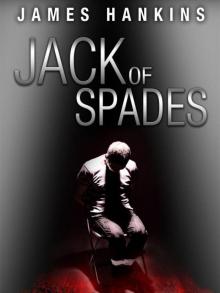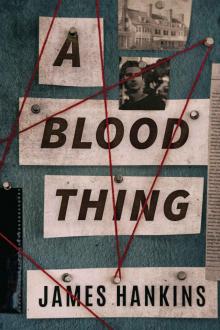- Home
- James Hankins
A Blood Thing Page 6
A Blood Thing Read online
Page 6
But that terrible day, when her attempts to keep Tyler from stepping out the window onto the slippery slate shingles of the steeply pitched roof were unsuccessful, she hadn’t run to get help. Both their mother and Mrs. Gallagher were out, but she could have run to Andrew. Yet she didn’t . . . because when she’d tried to stop Tyler, Henry had teased her yet again for being a girl and told her she was never any fun, and Tyler had joined in. It hadn’t been terribly mean-spirited, just kid stuff, really, but she was tired of hearing it from them, and tired of being the only one with common sense. So she watched her twin brother climb out onto the roof with Henry and his mile-wide mischievous streak. And she failed Tyler . . . with catastrophic consequences.
Now he was in jail, and she couldn’t be there for him. Tyler, in jail, accused of murdering a woman.
Which made no sense at all. Tyler could never hurt anyone. He was innocent. To her, that was an immutable truth, like the sun rising in the east or water being wet. So why was he behind bars? She couldn’t wrap her head around it. Her mind spun. So sleep was out of the question for now. If she had any hope of getting rest tonight, she was going to have to drive herself to physical exhaustion first.
So now, at three in the morning, in a second-floor bedroom that she had converted into a home gym, she punished the heavy bag without mercy, rapidly landing furious blows and powerful kicks one after the other, breathing heavily, sweating from every pore, refusing to stop for even a brief rest. Her hands and wrists ached. Every muscle in her arms burned. Her feet were sore. Her legs were growing heavier by the second. But she kept at it, imagining that the bag was Detective Ramsey, who had put her brother in handcuffs, before switching after a few minutes to Novak, who had read Tyler his rights. Then back to Ramsey, then Novak, back and forth, again and again. She saw their faces on the bag, driving her to increase the force of her blows. Maybe they were just doing their jobs, but—perhaps a little irrationally—she despised them for it. So she imagined beating them senseless until her limbs stopped responding to her commands. Then she staggered down the hall and collapsed facedown on her bed, sweaty and spent.
After a while she fell asleep and alternately dreamed of Tyler, alone in his cell, and Detectives Ramsey and Novak, toothless and bruised, bloody and in pain.
Andrew flipped from his back to his stomach, accidentally untucking the top sheet at the foot of the bed, which he always hated. A moment later, he rolled onto his side. A hand gently touched his back, and from the darkness behind him, Rebecca said, “You okay?”
“Sorry I’m keeping you awake.”
“I’m certain he’s okay.”
“I’m not, Becca. This is Tyler we’re talking about. He’s not equipped for something like this.”
“I’m sure he’s scared, yeah, and probably confused, but I’m just as sure that he’s safe.”
“I should have gone to the jail tonight.”
“You know you couldn’t have done that. You said yourself that you’d have to be cleared first.”
“I’m the governor. They could clear me pretty quickly.”
“You also said it wasn’t technically allowed. You’d have had to use your position to get in to see him, bully your way in. That’s not you. And as you said, even if you were successful in seeing him, behavior like that probably wouldn’t help his cause much.”
“No, I don’t suppose it would,” he conceded.
“You should try to get some sleep. You’ll need to be at your best in the morning.”
She was right about that. This was going to be huge news. A media shitstorm. And justifiably so. The brother of a sitting governor arrested for murder. Andrew was going to have to face this head-on, while somehow being there for his brother. He did indeed need to be sharp. But whenever his eyes were open, he saw the cell phone the stranger had given him, lying on his nightstand. And when his eyes were closed, the image of Tyler behind bars faded into view.
Finally, far too close to dawn, he slipped into a restless sleep.
Tyler sat in the holding cell on the bed, which was hard and very uncomfortable, way more uncomfortable than his bed at home. His forearms rested on his knees, which were drawn up to his chest, and his head was down in case he cried again. He wasn’t crying at the moment, but he probably would again soon. Who wouldn’t? This was terrible. This was worse than anything anybody else ever went through in history. He was in jail. For murder. He understood that now. Everyone had talked about it earlier, before he was arrested, but he’d been worried about the other thing he had done, so he hadn’t really paid much attention to all the murder talk. For a while, he wasn’t even sure they were talking about him, because he sure as heck hadn’t killed anyone, especially not Sally.
He was really sad. He was in trouble for something he didn’t even do. And he was lonely. But he wasn’t allowed to talk to anybody except his lawyer and his family. He didn’t even have a lawyer, though, as far as he knew, and his family wasn’t in jail with him, so how could he talk to them? The only people talking to him most of the time now were the guys in the other cell, and all they did was call him a retard and tell him that the cops were probably going to put them all in the same cell later, and when they did, he’d find out what happened to guys like him in jail. Tyler didn’t know what he meant by that—what happened to guys like him in jail—but they sounded nasty when they said it, so it seemed like something to be scared of.
So Tyler was scared.
And sad.
And lonely.
And it was a good thing his face was hidden because he was crying again.
CHAPTER ELEVEN
Andrew Kane awoke before seven on Saturday morning after far too little sleep. His first thought was of Tyler. He wondered how his brother had weathered the night in his cell. Andrew wasn’t certain whether Tyler had ever spent a single night away from home.
He was even more distracted at breakfast with Rebecca than he’d been during dinner the night before. She obviously understood and was content to eat in silence. He had two cell phones in his pockets, one of which was ominously silent while the other, his personal one, beeped or dinged every three or four minutes as voice mails, text messages, and emails poured in, all in response to the news of Tyler’s arrest. Numerous members of the news media broke protocol and reached out to him directly rather than go through his press office. Friends expressed their concern and support. Political opponents did the same, though with questionable sincerity. Even former governor Barker sent an email feigning sympathy over “this difficult situation.” His lieutenant governor, Lynne Kasparian, left a heartfelt message offering to do whatever she could to lighten Andrew’s load until everything was “sorted out.” Other than a text to Jim Garbose, his press secretary, asking him to draft a statement to release to the public, Andrew didn’t reply to anyone. He stopped checking his messages after two hours.
He did send a text to Henry, though, who responded immediately: Tell the goon out front that I’m coming to see you soon. The goon he was referring to was whichever state trooper happened to be assigned to Andrew’s security detail that morning, parked in front of the house, where a cruiser was always parked when the governor was inside his residence.
Henry arrived forty minutes later and followed Andrew down to his home office. “I saw Tyler a little while ago,” Henry said.
“You did? How’s he doing?”
“Scared out of his mind. At least they had the good sense to give him his own cell.”
“What did he say?”
“That everybody at the jail made him nervous. And that he didn’t kill anyone.”
Andrew nodded. He believed Tyler. He honestly did. But Andrew hadn’t spoken with him last night, nor had he visited him in jail today, as Henry had. He hadn’t looked him in the eyes, as Henry had. “You really do believe him, right?” he asked. He shouldn’t have had to; he truly didn’t believe he had to . . . but he asked anyway.
Henry frowned. “That he didn’t kill anyone? Absolutely. But I do
think he knew the victim somehow.” He paused. “Maybe in the way you and I discussed . . . but I don’t know. I can’t be sure. He didn’t want to talk about it. And I had to be careful. We were whispering, but we weren’t alone. There were guys in another cell and a cop standing not far away.”
“But you think he might have done . . . something?”
“I don’t know. Maybe.”
Andrew took in a deep breath, blew it out slowly. “But he’s okay right now?”
“Depends on your standard for ‘okay.’ He’s scared, like I said. He’d obviously been crying, which probably didn’t go over well with the cops’ other weekend guests. On the way out, I let them know who I was, my relation to Tyler, and the kinds of things I might do if I found out they hadn’t been nice to my brother.”
“And you said we got him a good lawyer?”
“The best. Rachel Addison. She’s already on the case. Ran into her in the parking lot outside the station a little while ago. She was on her way in to meet with him. I told her about Tyler’s issues. She said she’d keep it short today to avoid overwhelming him. She’s going back tomorrow, even though it’s Sunday. I asked if I could sit in, but she shot that down.”
“Of course she did.” Andrew thought back to his days as an assistant state attorney, before his turn as the state’s attorney general and then his ascension to governor. “I never faced her. She was pretty new back then. But I remember hearing good things.”
“I asked her to call me later. I’ll let you know what she says.” Andrew nodded. “So, I assume the mystery phone hasn’t rung, or you would have told me by now.”
“Not yet.”
Andrew pulled the bag containing the phone from his pocket and put it on his desk.
“I think it’s time to take that thing seriously,” Henry said. “Whoever that guy was, he knew there was going to be an arrest of some kind. That phone is definitely not a prank. I hoped for a while that it might be, but it’s not.”
“No, it’s not. But what is it then? How did that guy know Tyler was going to be arrested?”
“Two theories: either the guy is a cop or someone with a direct line to the cops . . . or he’s the real killer.”
“But what does he want?” Andrew asked.
Henry shrugged. “Whatever it is, he obviously wants it from you. Maybe because you’re rich. Maybe because you’re the governor. Maybe all of the above.”
“Either way . . .”
“Either way, it might be time to turn the phone in to the authorities.”
“You’re the authorities. Take it.”
“No, I mean through official channels. All signs point to it being evidence in the murder of a young woman, with the prime suspect being the brother of the state’s governor. I think from this point on, we should treat it as such. Turn it over to the troopers on your security team today. Tell them what the guy said. They’ll get it into the right hands.”
“Won’t everyone wonder why I didn’t do it yesterday when I first got it?”
“Say the guy seemed like a crackpot. You stuck the phone in your pocket and forgot about it. When Tyler was arrested, what the guy said came back to you.”
Andrew thought about it. That was probably the way to go. There might be questions about the delay, but the story Henry concocted was plausible. Andrew had no idea whether turning in the phone would help or hurt his brother’s cause, but it was undeniably evidence of . . . something, so he had an obligation, legally and even morally, to give it to the proper authorities.
He had just reached that decision when the mystery phone rang.
CHAPTER TWELVE
The phone was on its third ring when Henry said to Andrew, “Answer it.”
“Are you sure we should?”
Henry had no doubt about it. “We might not get another chance. He might never call back, and we could lose this lead.”
Andrew nodded and took the phone from the sandwich bag.
“Put it on speaker,” Henry said quickly.
Andrew did, and said, “Yes?”
“Is this Governor Kane?”
The voice sounded mechanical. Flat, inflectionless, robotic. Henry figured that unless Stephen Hawking was their mystery man, the guy was using a voice-changing device. Those things did a great job masking a person’s real voice. They were also easily obtainable. Hell, there were even phone apps that did the job and did it well.
“It is. Who’s this?”
“Please don’t insult me, Governor. Or can I call you Andrew?”
“Let’s stick with ‘Governor.’”
After a creepy, mechanical, monotone chuckle, the caller said, “I’m glad you kept the phone.”
“What do you want?”
“Am I on speaker?”
Andrew looked at Henry, who nodded. “You are.”
“Ah, so I’m guessing your brother is there with you. Hello, Henry.”
Henry hated this guy’s guts already. “I’m here,” he said. “What’s this all about?”
“Governor Andy,” the caller said, simultaneously dismissing Henry and disrespecting Andrew, “as you know, your brother Tyler is in deep trouble. Nobody yet knows how deep . . . except for me. Because I put him there.”
Henry quickly slid his cell phone from his pocket, opened its voice memo application, and began recording.
“What did you say? I didn’t catch all of that.”
After a brief pause, the caller said, “Go ahead and record this, Henry. I doubt it will do you much good. You won’t get any helpful information about me from the call, not with my voice masked. And if you play this for anyone claiming it proves Tyler’s innocence, they’ll just think you faked it. But knock yourself out.”
Henry had once tracked a reluctant witness to a gym. The witness, who hadn’t been happy about that, had hit Henry squarely in the balls with a twenty-pound barbell. Henry hadn’t hated that guy nearly as much as he hated this caller. Unfortunately, the caller might have been right about the usefulness of a recording. Still, it couldn’t hurt to have it. He kept recording.
Andrew said, “What do you mean, you’re the one who put Tyler in trouble? Did you call the police about him? Fake an anonymous tip?”
“No, Governor Andy,” the caller said, and the monotone robot voice was becoming an ice pick in Henry’s ear. “I mean I killed Sally Graham and framed Tyler for it.”
Holy hell.
“I did a really good job of it, too. Very thorough. Watched your family’s house in Manchester for months, knew everyone’s schedules, knew when Tyler would be home, alone, without an alibi. It’s a great frame job. A lot of moving parts to it. I’m actually quite proud of it. In my opinion, it’s a masterpiece.”
“Congratulations,” Henry said. “Give us your address, so I can come and shake your hand.”
“Governor Andy,” the caller said, dismissing Henry yet again, which was starting to royally piss him off, “I know you’re wondering what this is all about. Why would someone frame your innocent little brother for murder? What could he possibly want? Well, I’ll tell you . . .”
Henry exchanged a quick glance with Andrew.
“Soon,” the caller said. “I’ll tell you soon. You’re not ready to hear it yet.”
“Sure I am,” Andrew said.
Henry added, “Try us.”
“Sorry, not yet. Obviously, I want something. I wouldn’t go through all of this for nothing . . . taking the life of an innocent woman . . . ruining the life of an innocent, mentally challenged young man. I felt bad about the girl, by the way. I didn’t like killing her, didn’t enjoy it . . . but the truth is that innocent people suffer and die all the time. It’s just the way it is.”
“Listen,” Andrew said, “It’s no secret that my family has money. How much—”
“I’m only going to say this once so that we don’t waste time on it . . . this isn’t about money. Don’t mention it again. You understand?”
Henry was mildly surprised. He figured this
would be at least a little bit about money.
“Then tell us what this is about,” Andrew said. “What do you want from us?”
“Us? Meaning you and Henry? I don’t need anything from Henry. Just you, Governor Andy. Only you can give me what I want. But you won’t want to give it to me. It’s within your power, but you’ll be reluctant. And if I tell you what it is now, you’ll just say no. I want to wait until you’re more likely to say yes.”
“And when do you think that will be?”
“When Tyler has suffered a bit more in jail. When it becomes clear to you and to everyone else that he’s going to be convicted of first-degree murder and sent to prison for the rest of his life.”
“Why the hell should I give you anything?” Andrew asked.
“Because I can taketh away, and I can giveth.”
“Meaning?”
“Meaning I took away your brother’s freedom, and I can give it back to him. I can prove his innocence beyond a shadow of a doubt.”
“How?” Henry asked.
“You’ll have to take my word for it right now. I can set him free. Or I can bury him deeper. Much deeper. It will be up to you, Governor. Give me what I want, and they’ll have to dismiss the charges against him. Refuse, and the case against poor Tyler will become so airtight, even your own mother would vote to convict him, if she were still alive.”

 Shady Cross
Shady Cross Jack of Spades
Jack of Spades The Inside Dark
The Inside Dark The Prettiest One: A Thriller
The Prettiest One: A Thriller A Blood Thing
A Blood Thing Drawn
Drawn